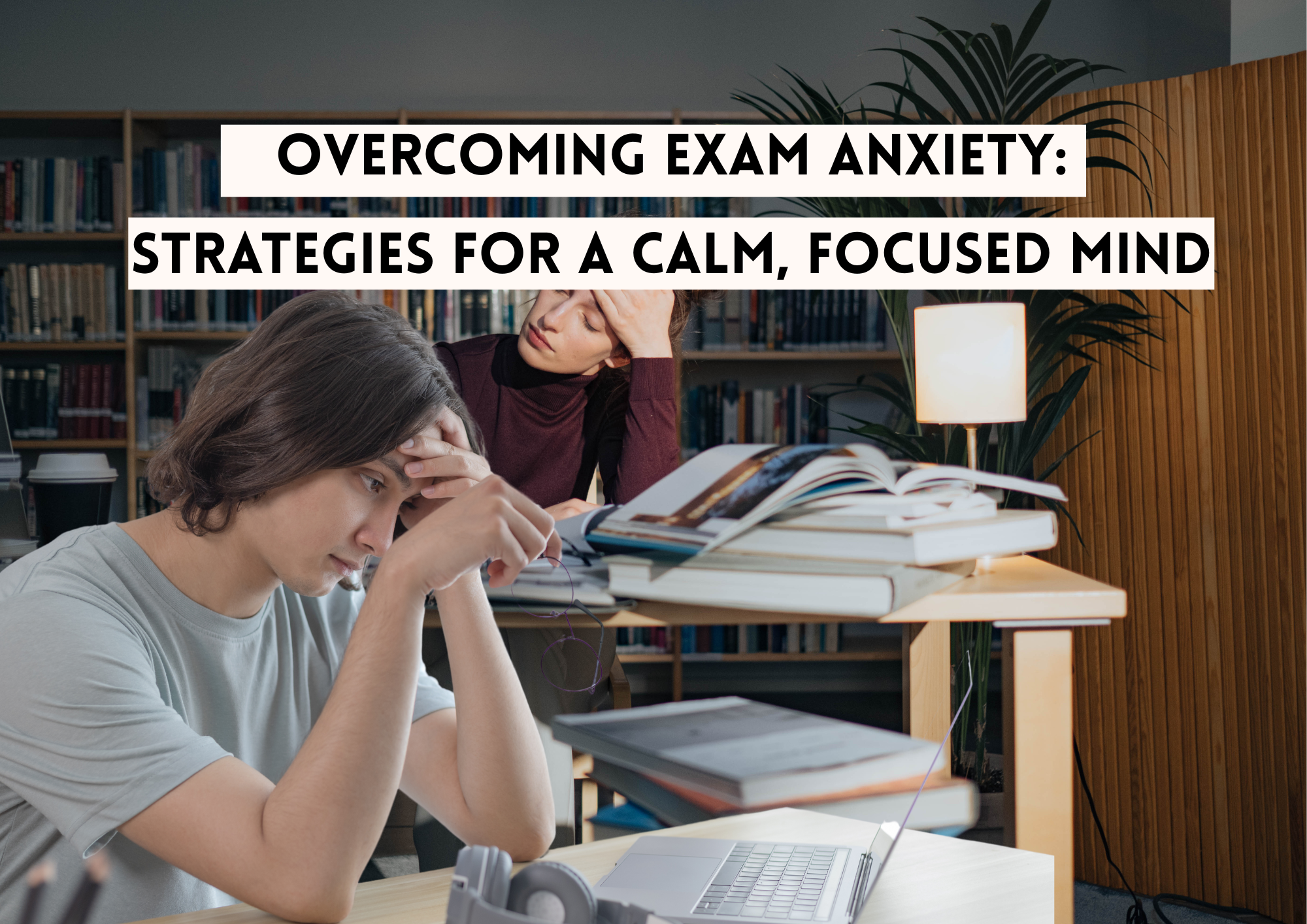Exam anxiety is a common challenge faced by students of all ages. The pressure to perform can often lead to feelings of stress, fear, and panic that hinder academic performance and overall well-being.
Fortunately, there are effective strategies for overcoming exam anxiety and developing a calm, focused mind during this critical period.
In this article, we will discuss various methods and techniques that can help students manage their stress, boost their confidence, and approach exams with a positive mindset.
Understanding Exam Anxiety

Exam anxiety is more than just nervousness; it’s a state of intense apprehension and fear that can affect cognitive functions like memory and concentration. Symptoms may include:
-
Rapid heartbeat, sweating, and shortness of breath
-
Difficulty concentrating and racing thoughts
-
Physical discomfort or tension
-
Feelings of dread or panic
Recognizing these symptoms early is an important step toward overcoming exam anxiety. Understanding that these reactions are common and manageable empowers students to take proactive measures.
The Psychological Impact of Exam Anxiety

Exam anxiety can have serious consequences on academic performance. When stress levels are too high, the brain’s capacity to recall information and think critically is diminished.
This means even well-prepared students may underperform due to anxiety. Moreover, persistent anxiety can affect self-esteem and overall mental health, leading to long-term issues if not addressed.
Realizing that overcoming exam anxiety is not only crucial for immediate academic success but also for long-term well-being helps motivate students to adopt effective coping strategies.
Strategies for Overcoming Exam Anxiety

Below are several techniques and strategies that have been proven to help in overcoming exam anxiety:
1. Develop a Solid Study Plan
A well-structured study plan can help reduce uncertainty and stress. When you know what to study and when to study it, you can approach exams more confidently.
-
Set Clear Goals: Break down your study material into manageable sections and set realistic daily or weekly goals.
-
Create a Timetable: Allocate specific periods for each subject, allowing ample time for revision and practice. A detailed timetable minimizes last-minute cramming and ensures consistent progress.
-
Include Breaks: Ensure that your plan includes short breaks between study sessions to avoid burnout.
Having a clear plan not only organizes your study routine but also provides a sense of control, which is essential for overcoming exam anxiety.
2. Practice Mindfulness and Relaxation Techniques
Mindfulness and relaxation techniques are effective tools for calming the mind and reducing stress. These practices help in achieving a focused state, particularly during exam preparation.
-
Deep Breathing Exercises: Practice deep breathing techniques to lower your heart rate and reduce tension. Try the 4-7-8 technique: inhale for 4 seconds, hold for 7 seconds, and exhale for 8 seconds.
-
Meditation and Mindfulness: Engage in daily meditation or mindfulness practices. Apps like Headspace or Calm can guide you through short meditation sessions designed to center your mind.
-
Progressive Muscle Relaxation: This involves tensing and then slowly relaxing different muscle groups to reduce physical tension.
Regular practice of these techniques can significantly aid in overcoming exam anxiety by promoting a calm and focused state of mind.
3. Utilize Cognitive Behavioral Techniques
Cognitive Behavioral Therapy (CBT) techniques help in identifying and challenging negative thought patterns that contribute to anxiety.
-
Reframe Negative Thoughts: Replace thoughts like “I can’t handle this” with “I am well-prepared and I can manage this.” Positive self-talk can boost your confidence.
-
Visualization: Imagine yourself performing well in the exam. Visualize the positive outcomes of your hard work, which can create a self-fulfilling prophecy of success.
-
Set Realistic Expectations: Understand that perfection is unattainable, and making mistakes is a normal part of the learning process. This mindset shift is crucial for overcoming exam anxiety.
4. Maintain a Healthy Lifestyle
A healthy body supports a healthy mind. Nutrition, sleep, and exercise are essential components of anxiety management.
-
Balanced Diet: Consume nutrient-rich foods that fuel your brain, such as fruits, vegetables, lean proteins, and whole grains. Avoid excessive caffeine and sugar, which can increase anxiety.
-
Regular Exercise: Physical activity releases endorphins, natural mood lifters that help reduce stress. Even a short walk or light exercise can significantly improve your mood.
-
Adequate Sleep: Aim for 7-9 hours of quality sleep each night. A well-rested mind is less susceptible to anxiety and performs better during exams.

5. Build a Support System
Don’t hesitate to lean on friends, family, or educators when feeling overwhelmed. A strong support system is a key factor in overcoming exam anxiety.
-
Discuss Your Concerns: Sharing your worries with someone who understands can alleviate anxiety. Often, talking about your stress can help you put it into perspective.
-
Join Study Groups: Studying with peers can make learning more engaging and less isolating. Collaborative learning provides both academic support and emotional reassurance.
-
Seek Professional Help: If anxiety becomes too overwhelming, consider speaking with a counselor or mental health professional.
6. Regular Self-Assessment
Self-assessment helps in monitoring progress and identifying areas that need improvement. It instills a sense of achievement and confidence.
-
Practice Tests: Regularly take mock tests to familiarize yourself with exam formats and manage time effectively during the real exam.
-
Reflect on Progress: Keep a study journal to track your progress, note improvements, and adjust your strategies accordingly.
-
Celebrate Small Wins: Recognize and reward yourself for milestones achieved in your study plan.
7. Stay Organized and Prepared
Being organized can greatly diminish anxiety. When you are prepared, you feel more in control, which in turn minimizes stress.
-
Keep Your Study Space Tidy: A clutter-free and organized study area allows for better concentration.
-
Plan Ahead: Avoid last-minute revisions by setting aside dedicated time for thorough review before exams.
-
Use Organizational Tools: Apps and planners can help you schedule your study sessions, assignments, and deadlines effectively.
Benefits of Overcoming Exam Anxiety

When you successfully overcome exam anxiety, you unlock several benefits that extend beyond the exam room:
-
Enhanced Academic Performance: A calm, focused mind improves your ability to recall information and solve problems during exams.
-
Greater Confidence: Reducing anxiety builds self-confidence, enabling you to tackle academic challenges with resilience.
-
Improved Mental Health: Managing stress through effective strategies leads to better overall well-being.
-
Lifelong Coping Skills: Techniques learned to overcome exam anxiety can be applied to other aspects of life, fostering sustained personal growth and success.
Conclusion
Overcoming exam anxiety is a critical component of academic success. By adopting a multifaceted approach that includes planning, mindfulness, cognitive behavioral techniques, and maintaining a healthy lifestyle, students can develop a calm and focused mindset that propels them toward success.
Implementing these strategies not only helps in overcoming exam anxiety but also equips students with the tools they need for long-term personal and professional growth.
Remember, the key to managing exam stress lies in preparation, self-care, and leveraging support networks. With these strategies, you can transform anxiety into a driving force for excellence and build a foundation for a successful future.
FREQUENTLY ASKED QUESTION
Q1: What is overcoming exam anxiety?
Ans: It refers to strategies and practices that help reduce stress and anxiety before and during exams, promoting a calm, focused mind.
Q2: How can mindfulness help in overcoming exam anxiety?
Ans: Mindfulness techniques, such as deep breathing and meditation, help center the mind and reduce physical symptoms of stress.
Q3: What role does a structured study plan play in overcoming exam anxiety?
Ans: A well-organized study plan minimizes last-minute cramming, boosts confidence, and helps manage time effectively, all of which reduce exam anxiety.
Q4: Are practice tests useful for overcoming exam anxiety?
Ans: Yes, regular practice tests familiarize you with exam formats and timing, helping to build confidence and reduce anxiety.
Q5: Can physical exercise contribute to overcoming exam anxiety?
Ans: Absolutely. Exercise releases endorphins, reduces stress, and improves concentration, aiding in overcoming exam anxiety.









